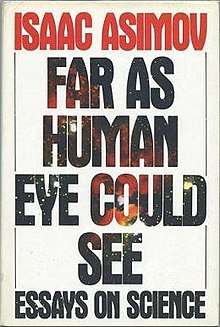Far as Human Eye Could See
Far as Human Eye Could See (published 1987) is a collection of science essays by American writer and scientist Isaac Asimov, short works which originally appeared in The Magazine of Fantasy and Science Fiction (F&SF), these being first published between November 1984 and March 1986.
 First edition | |
| Author | Isaac Asimov |
|---|---|
| Country | United States |
| Language | English |
| Series | Fantasy & Science Fiction essays |
| Subject | science |
| Publisher | Doubleday |
Publication date | 1987 |
| Media type | print (Hardback and Paperback) |
| Pages | 214 |
| ISBN | 0-385-23514-3 |
| Preceded by | The Subatomic Monster |
| Followed by | The Relativity of Wrong |
Contents
(with date of original publication):
- Part One: Physical Chemistry
- "Made, Not Found" (December 1984)
- "Salt and Battery" (February 1985)
- "Current Affairs" (March 1985)
- "Forcing the Lines" (April 1985)
- "Arise, Fair Sun!" (May 1985)
- Part Two: Biochemistry
- "Poison in the Negative" (July 1985)
- "Tracing the Traces" (August 1985)
- "The Goblin Element" (September 1985)
- "A Little Leaven" (October 1985)
- "The Biochemical Knife-Blade" (November 1985)
- Part Three: Geochemistry
- "Far, Far Below" (January 1985)
- Part Four: Astronomy
- "Time is Out of Joint" (February 1986)
- "The Discovery of the Void" (December 1985)
- "Chemistry of the Void" (January 1986)
- "The Rule of Numerous Small" (June 1985)
- "Superstar:" (March 1986)
- " Far as Human Eye Could See" (November 1984)
gollark: 1000% or so on my 27-cell reactor.
gollark: Reactor 2 at my base uses it.
gollark: I did come up with that simple pretty scalable design a while back.
gollark: Unfortunately NC also has a gazillion new ores.
gollark: More seriously, it's better than a gazillion new ores.
This article is issued from Wikipedia. The text is licensed under Creative Commons - Attribution - Sharealike. Additional terms may apply for the media files.